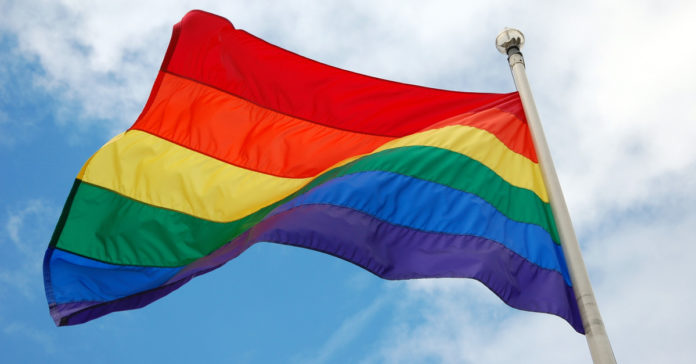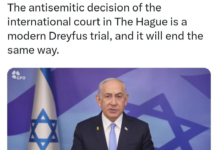Portuguese political activist and PHD candidate João Silva Jordão argues that homosexuality, once considered a cardinal sin by Christians, has now been transformed into an unlikely liberal virtue and into a Western geopolitical tool.
As a Muslim convert and political activist, there has been an issue which has come to my attention over the last few years, but which I have not had, until now, the capacity to put into words. Or at least, not had the capacity to put into the right words in the right way. Not least because it is a very sensitive topic.
I do, however, also believe that no matter how sensitive a topic may be, all opinions and angles must be taken into consideration, especially if there is no malicious intent.
It concerns the growing influence of the LGBT movement, and in particular, how the position of the West regarding homosexuality has undergone a fascinating dialectical inversion. But what has not changed, however, is the centrality that homosexuality occupies in the Western religious, philosophical and political mind.
It is easy to demonstrate, if only one takes a step back, that the sheer importance that the topic is given is completely arbitrary, and at times, simply bizarre.
Up until very recently in the West homosexuality was considered a capital sin. Nowadays, it’s a capital sin to be homophobic. What hasn’t changed, though, is the irrational amount of importance that is ascribed to the phenomenon of homosexuality overall.
I realise that it’s a paradox to declare that the topic of homosexuality is given more importance than it deserves, only to then write an article about it. However, the importance of homosexuality in the West’s political discourse has become an issue of concern for everyone around the globe, as no country or religion is free from the influence of the West’s political and military power, nor much less from the influence of its ideology – often referred to as the “liberal consensus.”
Subscribe to our newsletter and stay updated on the latest news and updates from around the Muslim world!
And perhaps most importantly, the reason why we must address this is because the alleged defence of the rights of LGBT communities has become yet another weapon in the West’s arsenal of dominance and oppression. In short, it has become yet another tool that perpetuates the West’s political, military and ideological hegemonic control.
There were plenty of elements that pointed in this direction for quite some time, but ever since Hillary Clinton declared in December 2011 that the U.S. was ready to defend the rights of homosexuals all over the world it became official U.S. government policy. The United States had finally admitted that they were now ready to enforce their own views regarding homosexuality all over the globe, and were ready to use full political force in order to do so.
The liberal consensus
LGBT groups have steadily been gaining in importance and prominence over the last decades. The defence of the rights of homosexuals, bisexuals, and any group deemed to be non-aligned with heterosexuality has become a rallying cry for an increasing number of groups and activists.
In the West, the legalisation of gay marriage has, in the space of a decade, gone from being accepted only within certain fringes of the radical left-wing to reaching near-consensus across the centre-left and centre-right spectrum. Furthermore, and perhaps most importantly, the absolute acceptance, and sometimes even outright promotion and glorification of homosexuality, has become a major factor used to differentiate the alleged “tolerant, civilised” West and the “intolerant, backward” Global South.
Debates around LGBT issues have also become a central battleground that more broadly opposes liberalism against traditionalism, and more specifically sidelines the vast majority of religious doctrines.
This same liberalism is, however, in a deep crisis, and the “liberal consensus” is starting to be seriously questioned across the board. Perhaps one of the main factors behind its faltering dominance is its emphasis, and sometimes even irrational and bizarre obsession, with issues such as homosexuality, which simply do not feature very high up on most people’s list of concerns.
Most people are still much more worried about putting food on the table, having professional opportunities, being able to enjoy peace and leisure, and the ability to pursue their dreams and aspirations. The obsession with homosexuality and the increasing trend to focus on areas such as “gender studies” are still very much, and will continue to be for the foreseeable future, a privilege of the Western liberal petty-bourgeoisie and upper middle classes, with academic and media elites being particularly adept at speaking about the subject at length.
These elites have demonstrated a surprising capacity to concoct an inexhaustible number of ways with which to transform LGBT issues into a paradigm in and of itself; a sort of ideology within an ideology, a lens through which every other subject can be viewed and analysed.
There are too many examples that demonstrate that this formerly niche-obsession with LGBT issues has become a central issue in global politics to be listed here. But from the ongoing debate and struggle in the United Kingdom regarding the inclusion of LGBT-friendly sex education as part of the school curriculum, to the Iraqi government’s recent denouncement of foreign embassies for flying of LGBT flags in what it sees, essentially, as a provocation, there can no longer be any doubt – the West’s bizarre obsession with homosexuality has now become everyone’s problem.
Is LGBT really a political priority?
This debate is generally viewed as being between those who support, or are tolerant of, homosexuality, and those who don’t actively support it or who clearly oppose it. But perhaps there is another, more important distinction that needs to be made – between those who see LGBT issues as a political priority, and those who don’t.
Most now agree that people should not be discriminated against in light of their sexual orientation. I certainly agree. But what about everyone else’s right to not have homosexuality, as a theme and practice, pushed on them constantly as some sort of virtue? And perhaps most importantly, what about everyone else’s right to have their own views about homosexuality and to communicate them openly?
Modern liberal doctrine would have us uncritically believe that throughout the history of mankind there has been an ideological and institutional superstructure, referred to as the heteropatriarchy, characterised by two factors – misogyny and homophobia – and that this superstructure has made it an absolute priority to actively oppress all expressions of gender and sexual preference that do not adhere to binary gender definitions and heterosexual sexual preferences.
According to this narrative, heteropatriarchy is often aided, inspired and perpetuated by religious institutions, and at its core is the intention to maintain “normative” relations so as to perpetuate its particular system of dominance.
But what if this were not true and was merely modern Western liberalism practicing a very particular form of projection? What if, by placing LGBT rights at the very top of their political agenda, they weren’t contradicting Christianity’s seeming intolerance of homosexuality, but were just the other side of the coin to the Bible’s mystical view regarding the nature of homosexual relations, and in particular, of sodomy?
We should consider the possibility that in attempting to banish a particular sexual practice into the realm of the absolutely forbidden, we also inevitably incur the risk of making that same practice into a fetish. And there is no better example of a part of our collective popular culture that grants mystical, grand and inexplicable importance to a sexual act than the story of Sodom and Gomorrah, the two cities destroyed by the wrath of God in great part because of their practice of sodomy.
In order to understand the importance of this Biblical story in Western culture, look no further than to the fact that the term widely used across Western languages to describe a man anally penetrating another man comes from the name of one of the cities destroyed by God – Sodom. It is also noteworthy that the Quran tells a similar story, referring to the “people of Lut.”
So as Muslims, we have to fight for our right to regard homosexuality and debates surrounding it as being inherently secondary, if not even peripheral and unimportant, whilst simultaneously continuing to promote our own ideal.
And what is that ideal? It is that men and women belong with each other; that men should marry women and women should marry men; that this cross-gender union is at the very centre of our religion and way of life; that healthy romantic and sexual relationships between the two genders are absolutely vital not only for the health of society and its ability to reproduce and survive across generations, but that it is the encounter between the two, distinct, complementing opposites of man and woman which projects us as individuals and as a society forward, making us stronger and better over time in the process.




















